This page contains some affiliate links. Please review my disclosure policy.
To be honest, I really thought I’d already written this post. But as I dug through the 6 years of archives on this blog, I realized I’ve never actually sat down to tell my mental health story in full. Sure, there’s been bits and pieces here and there and I certainly haven’t hidden anything from you, but telling the story start to finish (hesitant to say “finish” because I don’t think there’s an ending when it comes to mental health) has yet to be done. So here I am.
This week an Ask Me Anything on Instagram prompted a powerful question about my anxiety. From there I asked you guys what other questions you had about living with anxiety and the questions just kept on coming. I answered about 10 of them, but when the number got closer to 50 I knew I had to go deeper than a few 15 second clips on Instagram. I thought I would attempt a *brief* version of my mental health story and then answer some of your questions. A lot were repeats and some I don’t have the credentials to answer, but if I can I will! Let’s start from the beginning…
Everyone’s mental health story starts out the same: you’re born with a brain. In theory, we all have one and therefore it has a baseline level of health that we must support or maintain. I can say that while I certainly had moments of fear and worry growing up, for the most part my mental health was pretty stable. I did get a taste of what true anxiety and depression felt like when I went abroad when I was 15. I lived with a new family for 6 weeks and while I wasn’t old enough at the time to understand what was happening, I now know it was depression. But that’s also connecting the dots backwards and I quickly flipped back into my normal self when I got home. I got a brief taste of it, but I was okay.
The real beginning of my struggles with mental health began in my first year of college. Like most 18 year olds, ready to move out of their caregivers homes, I was excited to get to college and start a new chapter. A new chapter certainly began, but it wasn’t the one I had expected.
I thought living on my own, making new friends and handling a college workload would be easy. For some, it is. But the transition hit me hard and rather than talking to anyone about it, I turned inwards and spent most of my days and nights alone. I had moments of fun but mostly I was lonely, isolated and scared. The only way I felt I could control it was to put myself on a very rigid schedule. I woke up early, ate the same breakfast everyday (in my room alone), went to class, went to the library, ate dinner at a cafe and then went back to my residence in time for bed. I was a great student but virtually unrecognizable to my normal, outgoing self.
The thing about anxiety and depression is that it is pretty easy to hide. When I saw friends and family, I pretended everything was okay. When I wasn’t with them, the people who surrounded me thought I was just really busy, uninterested and very unfriendly. No one really knew what was happening in my head. Truthfully, I didn’t know what was happening in my head.
As finals rolled around in December of my first year, I found myself crying in a coffee shop where I had a very real, out of body experience of looking down on myself and not recognizing who I was. I knew something was wrong, I just didn’t know what. I went home for Christmas break that year and as everyone talked about how much they loved their new schools and friends they made I pretended I did too. I began blaming myself for those first few months. It seemed like everyone had an easy adjustment, except me.
When I returned to school in January I hoped for a fresh start, but as the cold, winter days in Montreal set in and my workload got more intense I instead tightened up on my already rigid schedule. I started working out everyday and getting very anxious about my food. I woke up at 6:00 AM to study and spent most of my day moving between the library, coffee shops and the gym. I did make a few friends but most of them also hated school so we spent a lot of time wallowing in our sorrows together. Subsequently, almost all of them ended up transferring away.
At some point it finally occurred to me that I wasn’t going to tackle what was happening to me alone. I knew I needed help. I thank that 18 year old girl for making one of the best and smartest decisions of my life: I called mental health services.
My school had a system in place to help you see a counselor and it’s something that I hope every school offers because my life trajectory would look so different if I hadn’t had this access. While the first therapist I spoke to wasn’t my saviour, I ended up seeing two others until I found someone I trusted. He diagnosed me with Generalized Anxiety and Depression and together we charted out a plan for helping me to better acclimate to school and get on top of my mental health.
I wish I could say that my story ended here and it’s been smooth sailing ever since. Spoiler alert: it hasn’t. This is true of anyone with mental health challenges: it’s a journey, not a destination. Together with a psychiatrist I ended up seeing I started medication for my anxiety and depression. It wasn’t a magic pill and it wasn’t without a lot of experimentation but it helped and at that point in my life I needed all the help I could get.
Through therapy, medication and lifestyle changes, I was able to finish the winter semester and even went back to school the following fall. I definitely felt alone and a whole lot of shame around my anxiety and depression so only a few people knew what was going on. In hindsight, I wish I’d been more open about it because I’m certain I wasn’t the only one struggling.
Since this experience I’ve had many ups and downs with my mental health. Sometimes years without any depressive symptoms though anxiety is a lot more frequent. I continue to take medication (I’ve switched a few times), have made a lot of lifestyle changes and know my triggers. I’m also a lot more transparent about my struggles and find deep comfort in knowing I am not alone. They also say that one of the best ways to heal is to help others and I’ve definitely found that to be true.
For a long time I carried a lot of shame for working in the health and wellness space and also being on medication for my mental health. I thought if people found out, they would judge me for it. Instead I’ve found most people to be supportive and understanding of my decision (with the exception of a few negative comments). I’ve also had to learn to accept that this may be something I struggle with for the rest of my life and I may also be on medication for the rest of my life.
But here’s the truth: my medication allows me to do all the lifestyle habits that allow me to manage my anxiety and depression. I’ve gone off them before and tried to manage them holistically but honestly, it felt like a full-time job caring for my mental well-being. I wasn’t living my life, I was managing it.
So here I am, 10 years into this journey and feeling pretty damn confident in who I am. Yes, I have anxiety and depression. Yes, I am susceptible to more challenges with my mental health. But I am also a badass business owner, wife, dog mom, daughter, friend and human. Not everyone has it as easy as I do. I’m able to manage my symptoms and thrive despite my diagnosis. For this I am truly grateful. And honestly, I wouldn’t change a thing.
YOUR QUESTIONS ANSWERED
What makes you anxious?
I have generalized anxiety so I struggle with an overwhelming amount of worry around what others would perceive as little things. I oftentimes feel like things are out of my control (for the record, they are but coming to terms with that is super hard!) and that I can’t get a handle on anything. I also have a few specific triggers: cars being the biggest one, fear of losing loved ones and failure. In the past I struggled with social anxiety, food/eating issues and travel (not planes but being away from home) but I’ve been able to work through most of these.
What is your best anxiety relief tip?
If you aren’t talking to a mental health professional, I would recommend you start. From there you can work on relief practices that can be helpful to you.
What type of doctor is best to see when it comes to anxiety?
There are SO many doctors and mental health professionals out there. If you don’t know where to start, try talking to your primary care physician and see if they can give you a referral or immediate relief. Psychologytoday.com is a great place to find a therapist in your area. Some people specialize in certain techniques for anxiety/depression specifically and that could be super helpful but if you don’t know where to start, try going general and be open to where that takes you.
What methods have you tried throughout the years has been the most helpful?
Medication is definitely top of the list. But when it comes to lifestyle habits: yoga, meditation, deep breathing, journalling, talking to someone and CBD/THC have been the most helpful. Things I’ve tried that haven’t helped: supplements (I take supplements but none have helped with anxiety specifically), exercise (besides yoga) and diet changes.
What do you do to provide immediate anxiety relief?
Most of the things listed above help me maintain my mental health, but in those major anxious moments, deep breathing and talking to someone takes the cake. I’m lucky to have a super supportive partner who through the years has learned how to help me through these moments. He has to (and I oftentimes have to) remind myself that I am not the emotion I am feeling and to identify what I am feeling and where I am feeling it (yes, physically) can help me a ton in feeling that sense of control over a situation.
Are meds the best long-term solution or can they be replaced with holistic methods?
This is entirely up to you. For me personally, meds allowed me to do the holistic practices to support my mental health without them taking over my life. I find that the simpler I can make my life, the less anxious I am. Whatever you choose to do is up to you #YOUDOYOU
How do you slow the racing thoughts?
Get them out of you! Write them down, talk to someone. I find when I get them out of my head I realize how not rooted in reality most of them are.
What do you do on the hardest days?
Feel your feels. The days that are hardest I allow myself to feel what I’m feeling and talk it out, write it out or move through a yoga flow. I do find that sometimes it’s helpful to be busy and actually go out and see people but I’m usually not up for that on the hardest days. Take them as they come is my main piece of advice.
Have you looked into CBD oil?
Yes, it can be great! I do find it needs to be at a high dosage to be effective. I also prefer the consume CBD with a little THC to activate it (it’s legal in California). But more on that in another post.
How were you diagnosed?
I was diagnosed by a therapist, as mentioned above. I saw several therapists before switching to a psychiatrist who specialized in talk therapy. I liked having someone to talk to who also was able to support my medication use.
What meds are you on?
I am on Lexapro (Cipralex in Canada). I’ve also taken prozac, wellbutrin and another one I can’t remember.
Have you found a way to avoid using meds or reduce them?
No, I haven’t. I’ve come off my meds twice. Once for a year and a half which was positive, until it wasn’t. I came off again and after both times I had two depressive episodes. I truly think they’re more effective for my depression than anxiety. I currently take a very low dose but it works well for me.
How do you know if your medication dose is right?
Trial and error. Keep notes on how you feel and if you’re dealing with any side-effects. Be open and transparent with your doctor about these and trust that they want you to feel better.
Have you lost friends due to your anxiety and depression? If so, how do you go back?
Yes, I have lost friends. Not a lot, but some. Truthfully, I haven’t gone back. I believe in filling your life with people who understand and support you. If they cannot be there during this scenario, I’m not certain they’re the kind of people I want in my life.
As a parent of a college student, how can I tell if my child is struggling with anxiety?
This is a tricky one and I’m not sure I’m the best person to give an answer, but I think one of the easiest ways is to just ask. Ask how they are doing and if they’ve found the transition difficult. Ask them about their daily routine and the friends they have. Of course, anyone can lie but making sure they know you are open to talk and won’t judge them can go a long way.
Do you run into discrimination/stigma when people find out you take meds?
Yes and no. People are sometimes quick to challenge my decision but ultimately, I know what is best for me. It was something I didn’t talk about for a long time for fear of being judged. Especially given that my business is in the health and wellness community. But as I’ve shared more I’ve discovered that a) I’m not alone and b) health and our health choices look so different on everyone and for anyone to pass judgement is ultimately on them, not me.
That being said, I appreciate you guys keeping this post and this blog as a positive and safe space for anyone with mental health struggles. I want you to know you can always turn to this community for support and understanding, but I have a zero tolerance policy when it comes to judging people’s choices. Thank you for understanding!
Photos by: Bettina Bogar
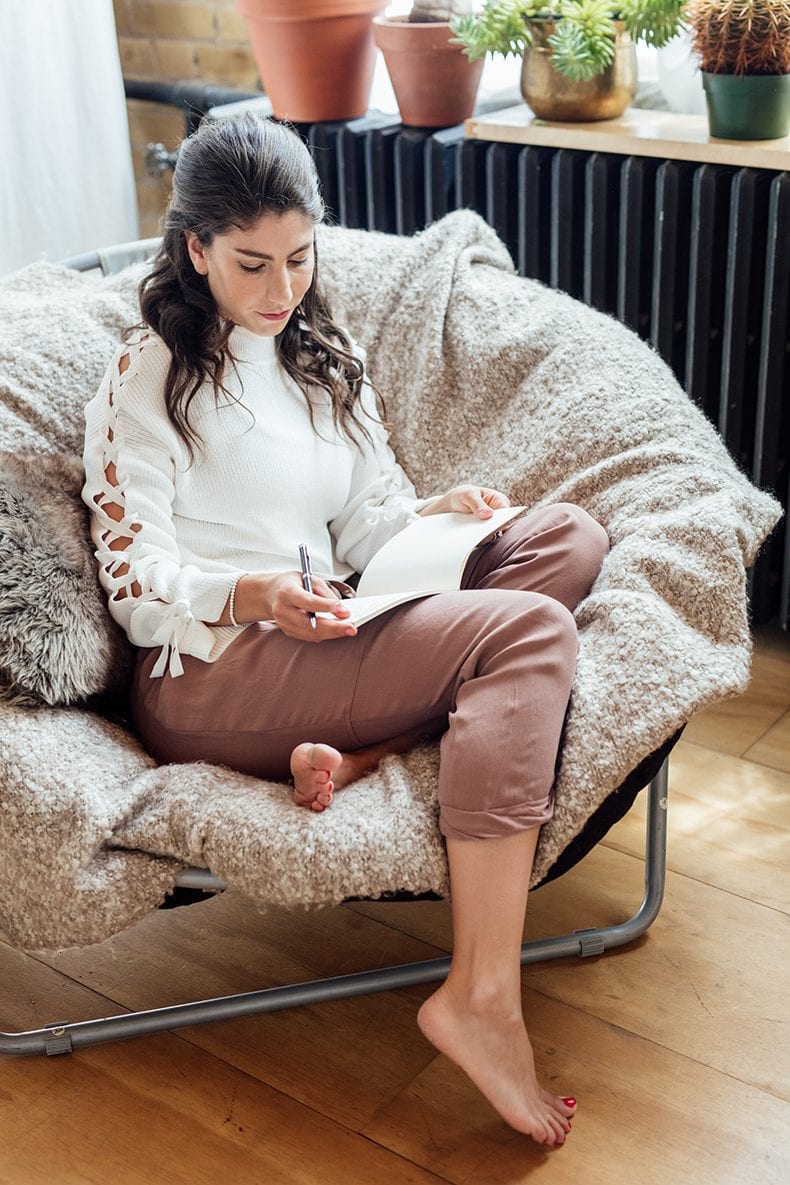
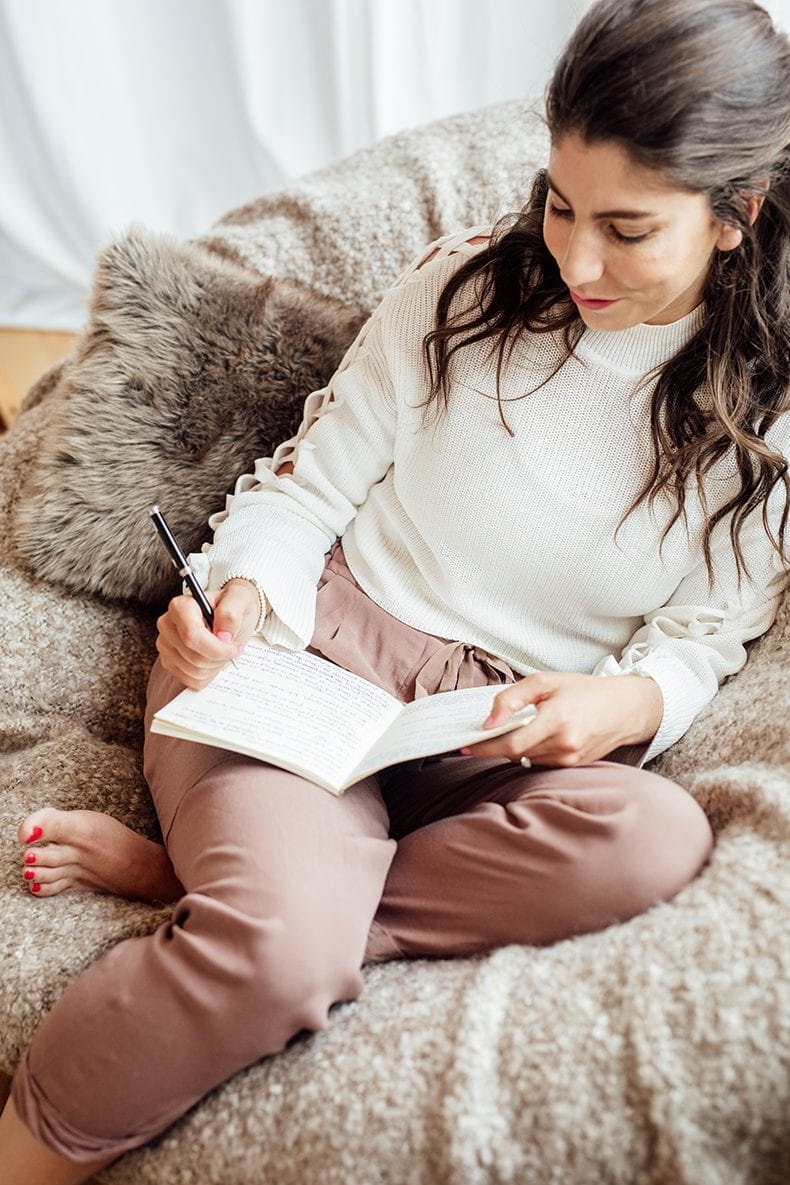
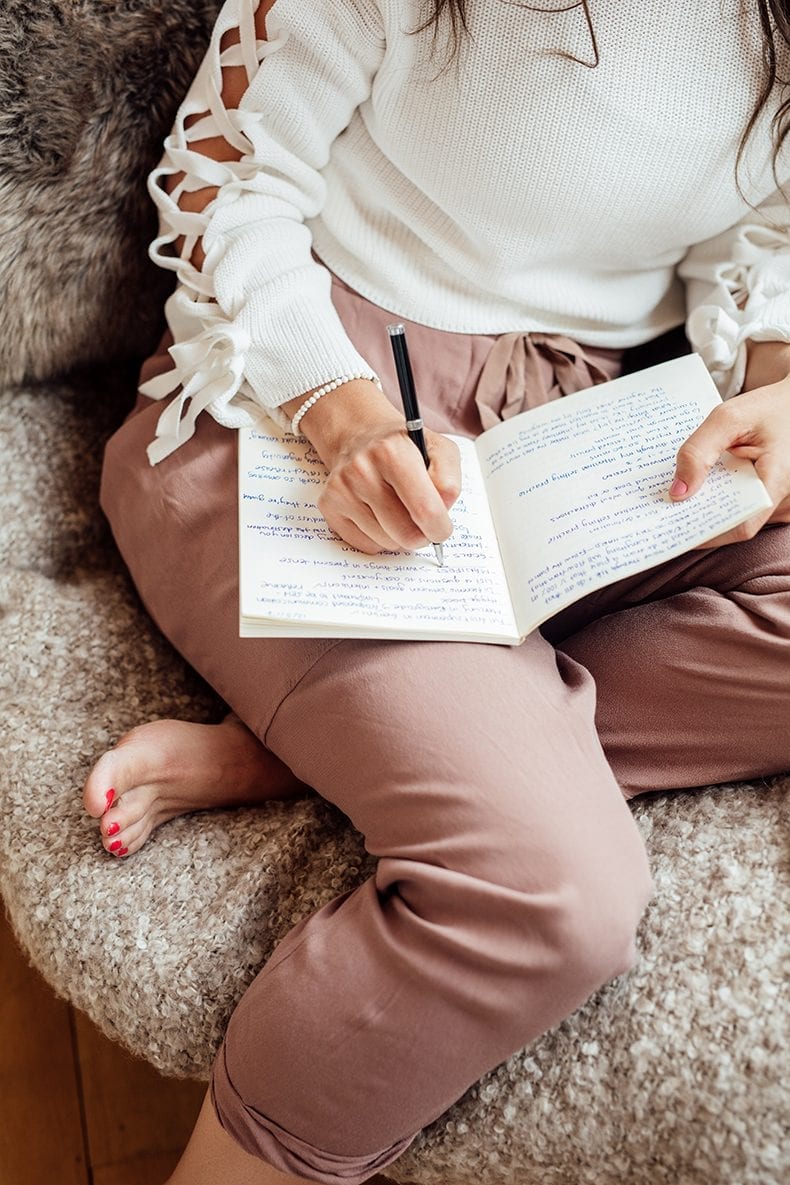
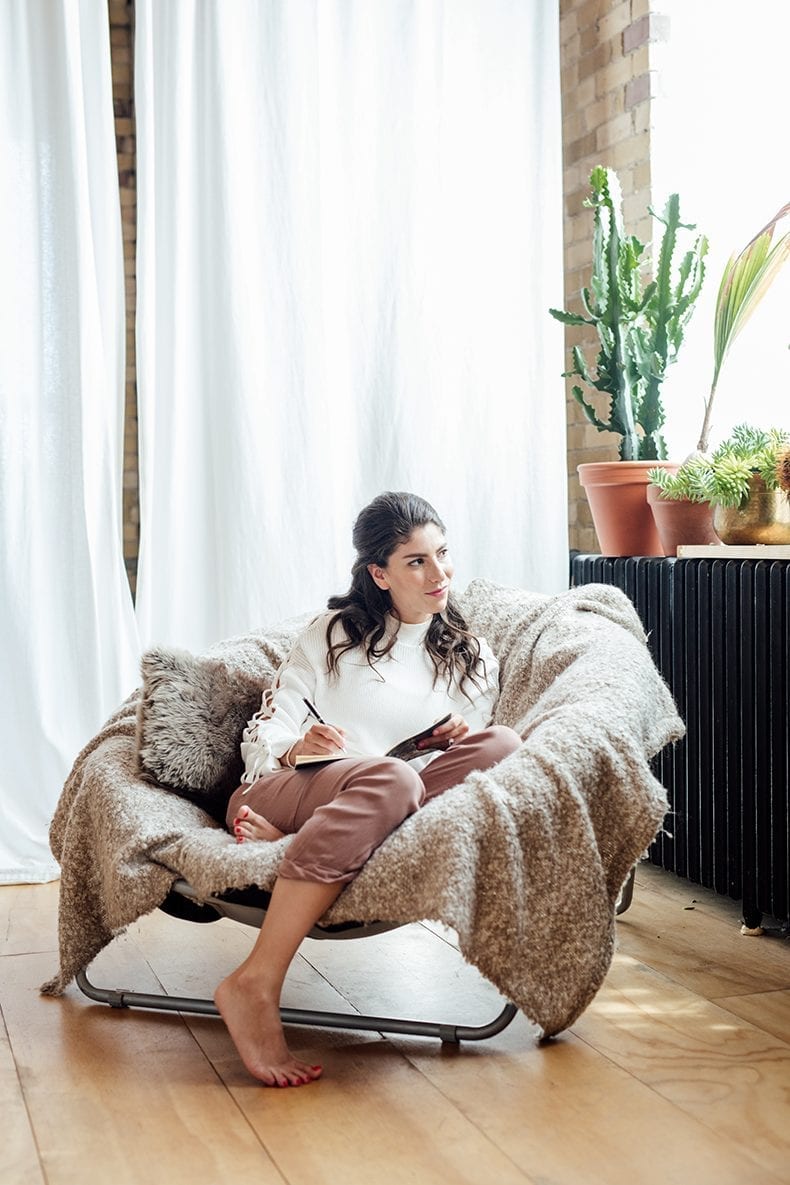
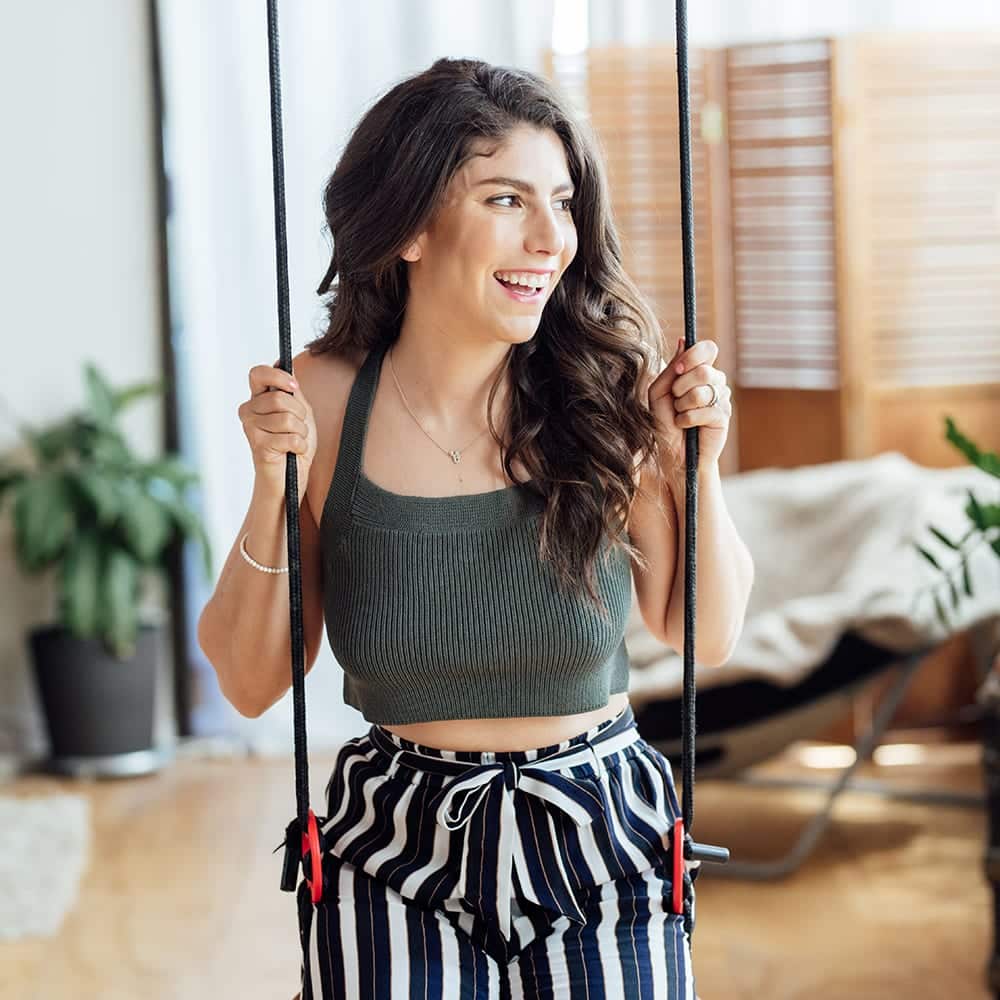
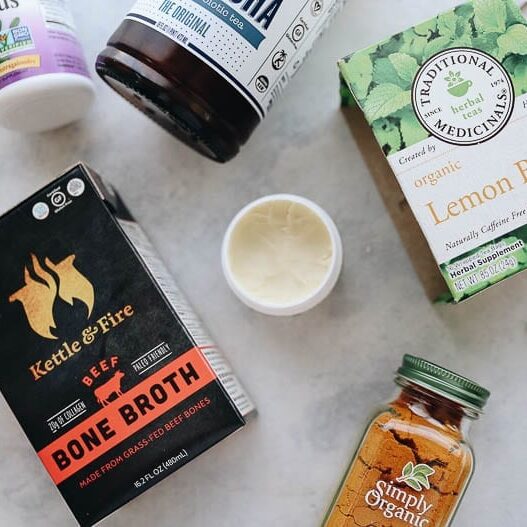
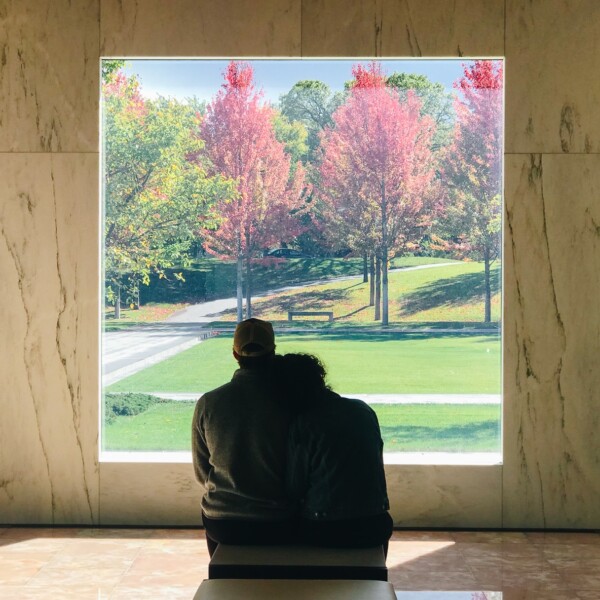
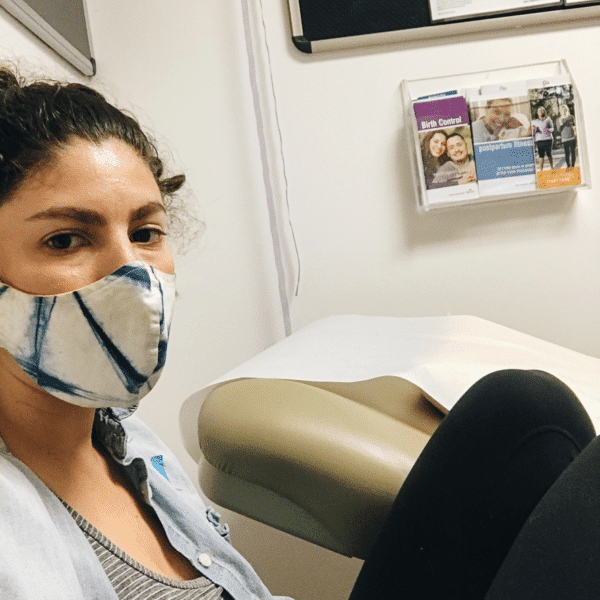
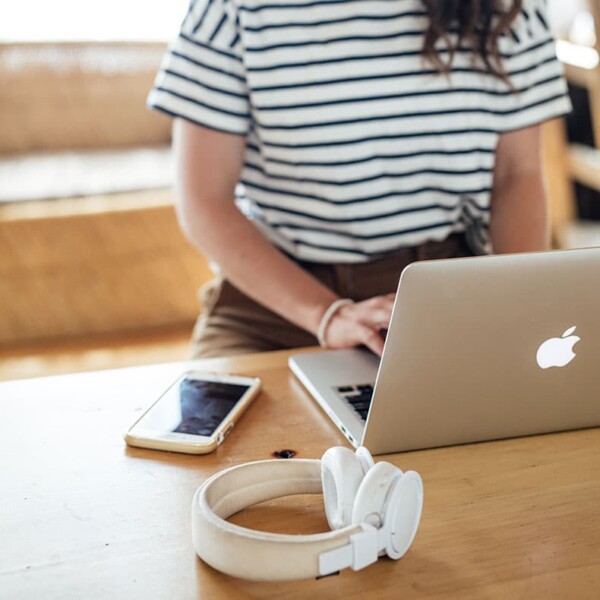





Thank you for sharing this story. I am 67 and have managed my mental health since I was 14. I have seen a number of mental health care practitioners and taken medication for all my life. I have not been able to manage without medication.
I am taking less medication now, than I have in the past. I have two Masters Degrees and I had a career for thirty years . I have never conquered the anxiety or depression. I control it with meditation, medication and exercise.
The stigma of mental illness still exists. Honestly, attitudes have not changed that much. While treatments have improved, mental health protocols aren’t as advanced as I would have hoped.
Anyway, thank you this website.
Thanks so much Davida for sharing your story! It helps a lot to know that I am not alone. Your story resonates with me. My anxiety began when I was 17 after my parents divorce, and when I moved to Barcelona to study pharmacy. It ‘s a journey as you say. I’ve been taking meds as well, and tried to come off three times because I wanted to try with natural remedies that didn’t work. Now I understand that maybe I’ll need the medicine the rest of my life, but it allows me to stay healthy.
Thanks so much for being so transparent Davida, you are helping a lot of people!!
Lots of hugs,
Elisenda
Learning to heal our emotional selves in a deep way is so important. I personally feel depression and anxiety are symptomatic of deeper expressions and needs from the soul wanting to come forth. I too have experienced deep depression from significant trauma. I healed through shadow work and inner child healing, having a daily feeling practice to honor my emotions and journaling in a way that helps me understand myself, the core root of where my pain is coming from.
The soul speaks to us in symbols. We have inner pains that we project onto other life experiences, feeling pain from what that thing means to us. The symbolism of the thing rather than the thing itself.
Thank you so much Davida for sharing this brutal honesty!!!! I find it truly beautiful and brave, as I also struggle with depression and anxiety. These conditions MUST be talked about more to get rid of the stigma in the world. Thank you for making us all feel stronger by sharing your experience and letting us know we are not alone! <#
I really appreciate you to openly share your story, not many have the courage to do so and it really is helpful and inspiring for many of those who suffer alone, it makes them feel they’re not alone and that really is helpful.
I am curious to know, could your major of studies in college be affecting your emotional experience and has been causing you an enormous amount of stress or is it not related?
Hi David,
I came across your blog as I was researching to begin my own blog that I have been thinking about starting since 2014! That was around the time I began to really feel the effects of what I was later told by my doctor was anxiety and mild depression. The timing of coming across your post was a miracle and a sign for me that my decision to finally start my blog is the right one. I took a class about blogging basics last night and then came across your blog and this story today. Your blog will be an inspiration to me and I hope to be a part of your blogging community.
Oh my, my computer autocorrected your name and I didn’t realize it. I am so sorry Davida!